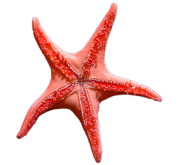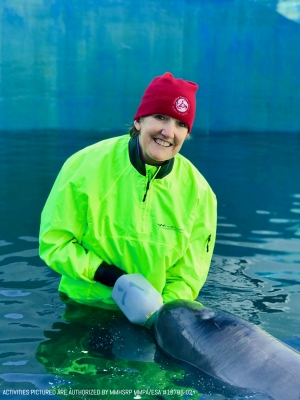Beluga Rehabilitation at Alaska SeaLife Center Spurs Scientific Knowledge December 9, 2021
Seward, Alaska (December 9, 2021) – The Alaska SeaLife Center (ASLC) announces the publication of “Stranded beluga (Delphinapterus leucas) calf response and care: reports of two cases with different outcomes” in the journal Polar Research primarily authored by ASLC’s Director of Animal Health, Dr. Carrie Goertz.
This publication was two years in the making and highlights the response and care of two beluga calves at the Center: Naknek rescued in 2012 and Tyonek in 2017. Both cases detailed in the piece provide invaluable information about the beluga populations the calves originated from and new information on wild beluga neonates.
Collecting the data for this publication while rehabilitating beluga calves required a collaborative effort from many prestigious contributors like SeaWorld, Mystic Aquarium, Shedd Aquarium, Vancouver Aquarium, Georgia Aquarium, Woods Hole Oceanographic Institute, and the National Oceanic and Atmospheric Association. “I am so proud of how the professional zoological community came together to care for and learn from both calves. Looking back, I know that it was exhausting and emotionally draining at times, but what I really remember is the joy of seeing the beluga calves respond to treatment, watching their personalities develop, and feeling the support and camaraderie of the care team. The group brought decades of experience caring for stranded cetaceans as well as neonatal belugas and dolphins in aquaria in order to support both Naknek and Tyonek,” explains Goertz.
The rehabilitation success rate of beluga whales is extremely low. While Naknek succumbed to his ailments in 2012, he survived the longest out of any rehabilitated beluga calf at that time.
The team beat the odds in Tyonek’s case, however, making him the first beluga calf to be successfully rehabilitated in the world. After spending about six months in rehabilitation at the Center, Tyonek became a resident at SeaWorld San Antonio in 2018 where he remains integrated into their pod. Steve Aibel was one of the cetacean experts from Shedd Aquarium that contributed to Tyonek’s care in Alaska and now continues to work with him at SeaWorld. “Working with Tyonek, from day one to date, made visible the strength, powerful contribution and impact that comes from collaboration within the zoological community. This was one of many instances where animal care experts, veterinarians, and research scientists from multiple organizations came together with a singular goal of helping a little whale in need. I distinctly remember a room filled with hundreds of years of beluga whale experience working together to solve the many challenges Tyonek faced,” states Aibel, Vice President Zoological Operations at SeaWorld San Antonio.
These cases demonstrate the ability to care for and rehabilitate stranded beluga calves, once thought to be impossible. The findings in this paper offer tools to assist in the conservation of endangered populations as well as aid in wildlife rescue in the future. “The greatest part is this important story is still being told today with the help of a healthy and thriving whale. I am not unique in saying that this experience changed the people who cared for him 24 hours a day for several months. In truth, every rescue does that! Every rescue matters as does every animal that we care for. They all add to the collective knowledge that helped Tyonek and will continue to help even more animals in need,” continues Aibel.
Support for the care of these beluga calves came from the Alaska SeaLife Center, Georgia Aquarium, Mystic Aquarium, SeaWorld, Shedd Aquarium, the Texas Marine Mammal Stranding Network, and Vancouver Aquarium. Additional funding was provided by the Prescott Grant Program, Prescott Emergency Grant Program, SeaWorld Busch Gardens Conservation Fund, and individual and corporate donations to the Center’s Wildlife Response Program.
The scientific article can be found on the Polar Research website here.
About ASLC
Opened in 1998, the Alaska SeaLife Center operates as a 501(c)(3), non-profit research institution and public aquarium in Seward, Alaska. The Center generates and shares scientific knowledge to promote understanding and stewardship of Alaska’s marine ecosystems. The ASLC is an accredited member of the Association of Zoos and Aquariums. To learn more, visit www.alaskasealife.org.


